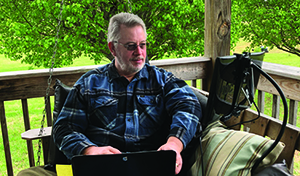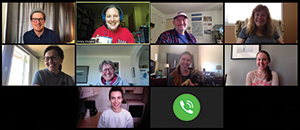
Like journalists across the globe, Jeff Finley, executive editor of Light+Life, was plotting the best way for his Indiana-based publication to cover the escalating coronavirus pandemic.
Then things turned personal.
One of his sources, a Louisiana pastor and community leader, died after contracting COVID-19.
“That was just a real shock to me,” Finley said. “I’m guessing as things progress that will, unfortunately, be the case for not just me, but other editors as we start to know people who are affected.”
In the soup of suffering, however, God is ever present. Christians in China, the nexus for coronavirus, are discovering new hope—and a new freedom—as they boldly share their faith, according to Cheryl Odden, executive editor of Voice of the Martyrs, which is headquartered in Bartlesville, Oklahoma. Odden said VOM, an international nonprofit that advocates for persecuted Christians around the world, recently sent an email to its constituents highlighting unique, and unlikely, ministry opportunities that have emerged in the wake of the pandemic.
“China’s oppressive facial-recognition cameras are less likely to identify them when they are wearing masks,” the ministry noted.
In the face of shelter-in-place orders across the country, Christian media are navigating through unfamiliar territory, seeking truth in a sea of uncertainty and rumors, while balancing reality and hope for readers. Unlike many Americans, journalists are still able to work from home, but rhythms and patterns have shifted as they maneuver through new obstacles: shuffled deadlines, obsolete stories, preoccupied sources, travel restrictions and new learning curves for technology. Homeschooling, for many, adds another complicating equation.
“It’s been a juggling act to decide how much time should we invest in this, putting things online while also trying to make sure we have the content for our print magazine,” said Connie Faber, editor of Christian Leader magazine, located in Hillsboro, Kansas.
Without a home office, or even a desk, she’s converted her dining room table into a temporary workstation and struggles to tune out household demands.
“I think mentally it’s just hard to stay productive,” said Faber, one of two-part time editorial employees.
John Kennedy, news editor for the online AG News in Springfield, Missouri, said he is also dealing with boundary issues now that he’s homebound.
“The big temptation is you know the computer’s sitting there in the corner,” he said. “The work is always there if I choose to go do it rather than just leaving it behind at the end of the day.”
Remotely easy?
In many ways, the technology that allows writers and editors the freedom to work remotely has lessened the demands of decentralized newsgathering. The advent of wireless networking, social media, video conferencing and collaborative software has helped eased a scenario that just a decade ago would have seemed unfathomable.
At Finley’s Light+Life, for instance, the communications department decided, just a week shy from printing 13,000 magazines, to temporarily shelve its print edition, which is distributed through Free Methodist USA congregations across the country. Instead, the magazine was published digitally, offering readers the option of an online flipbook or downloadable PDF.
“It’s something we’re feeling like we need to do,” he said, “because of the distribution (issues).”
Finley said they are hoping the move will increase the publication’s exposure by reaching “people who don’t normally see the magazine and might be more shareable for other people to be introduced to the magazine.”

Danny Conn, director of editorial and strategic projects for Randall House Publications that publishes the quarterly Fusion magazine and six other EPA member publications, said his company decided to upload all of its most recent devotional resources to help parents in their discipleship efforts at home. The Nashville-based publisher, the publishing arm of the National Association of Free Will Baptists, specializes in family discipleship curriculum used by many denominations.
“The timeline of this actually has fallen into a good window for us because everyone had already ordered their spring curriculum,” he said.
As part of its normal operations, Randall House relies heavily on its website, Facebook, Twitter and their own D6 Family app.
“Being a small company, we can move pretty quickly,” Conn said, adding that initiatives can be implemented within days. “We can adjust and do things we need to do.”
Skirting obstacles
Melody Copenny, managing editor of Cru Storylines in Orlando, Florida, said her team was able to swap out several stories within a 5-day window, a speedy switch up for a publication that plans its editions three months out.
“(We were) able to respond to what our readers are experiencing—and what the world is experiencing right now—because of the coronavirus,” she said.
Ongoing travel restrictions idling photographers is one factor driving content change at Cru. Anticipating similar issues in the coming months, Copenny’s team will conduct a creative session to develop novel ideas on newsgathering.
“God’s stories of what He’s doing in the world and how He’s reaching people with the gospel isn’t halted because of this virus,” Copenny said. “He’s very active and continues to touch the hearts and lives of people, as many are open to Jesus because of what’s happening with coronavirus.”

Kristy Glaspie, publications manager for World Vision’s storytelling team, said the print edition of its tri-annual magazine, due to be published this summer, has been canceled and will be published digitally instead. In addition to the magazine, the Washington state-based ministry also maintains an active online news site.
“We are looking at retooling some of the content that we’re going to have in our summer magazine just to be able to include more on COVID,” Glaspie said.
She’s also keeping a watchful eye out for their newly modified production system.
“The big question will be when we start getting into production for the magazine,” she said. “It’s a little bit different when you’re trying to go through an entire proof of a magazine collectively as a group, virtually.”
In Nashville, Lindsay Nicolet, managing editor of content for the Southern Baptist Ethics & Religious Liberty Commission’s website, said the immediacy of its online platform has allowed her editorial department to keep pace with rapid-fire coronavirus coverage.
“If anything, it’s sped things up because everyone is kind of working in overdrive,” Nicolet said, adding that ERLC’s Washington, D.C. bureau continues to monitor public policy.
Coronavirus overload?
Each of the editors interviewed for this story said they are focused on maintaining an appropriate balance between covering the pandemic and highlighting day-to-day stories that promote their mission and vision.
“Early on, it felt like we were doing too much,” Nicolet said. “But as the days have gone on, the weeks have gone on, I think that it’s necessary because it continues to invade and change and transform every aspect of our lives.”
Kennedy, the AG News editor, wonders if the coverage is reaching its zenith.
“There’s going to be a point where (it reaches) saturation and people want to read something else,” he said. “Maybe we’re already there. I don’t know.”
by Lori Arnold, Evangelical Press Association
Related posts
Category: Magazine publishing, Tips
“It’s time to launch creative solutions to increase staff size and resources without sacrificing quality — and do it with an eye to the uncertain [...]
Magazine Training International’s mission is to encourage, strengthen, and provide training and resources to Christian magazine publishers as they seek to build the church and reach their societies for Christ.

